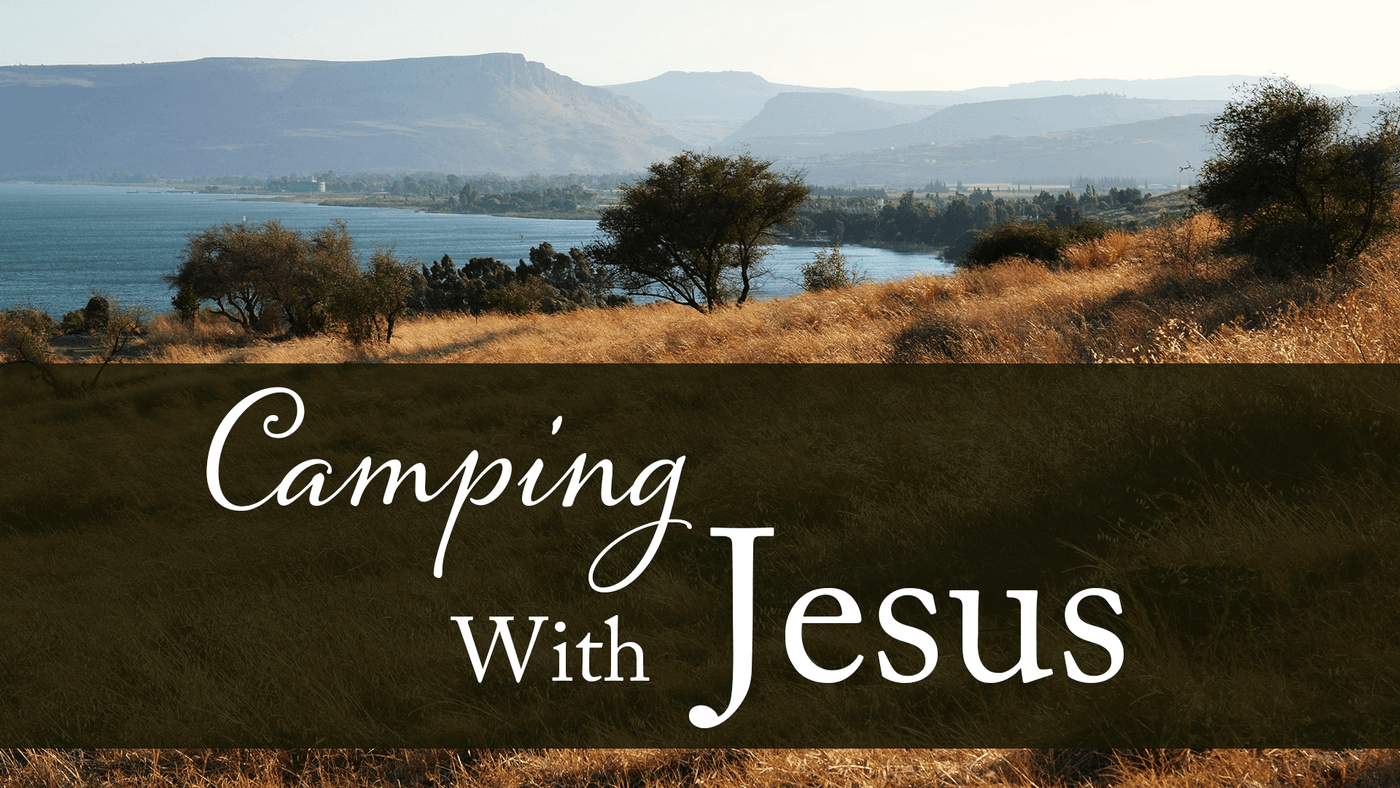Introduction
We are going to continue in our series called Camping With Jesus.
Today’s message is called Useful Works.
Over the last couple of messages in this series we looked at the Beatitudes. And what we learned is that they are largely counterintuitive to what most people would really want.
- We don’t want to be poor - in anything.
- Most people do not desire humility we desire fame.
- We do not desire gentleness we desire absolute power...
- And we certainly do not desire rejection, or persecution yet Jesus says theses things will make us happy.
The whole thing just seems backwards IF you do not have a renewed mind.
1 Corinthians 1:18 (NLT)
The message of the cross is foolish to those who are headed for destruction! But we who are being saved know it is the very power of God.
But this is the opening thought that Jesus gives us in the Sermon on the Mount.

You!
The first word he uses in in verses 13 & 14 is “you”.
Jesus is addressing his listeners and says something about them directly. So before we look at what he says, lets ask WHO he is saying it to.
So, Who is Jesus talking to?
Well, this is actually a subject of much debate.
While there is no debate that there was a large crowd, who is in the crowd and who among the crowd is Jesus speaking to are debated.
Some people feel that Jesus was talking exclusively to his disciples, as in the 12 and the huge crowd is just witnessing it.
I don’t buy that. The idea that Jesus is speaking in front of a “great multitude”, which is the only biblical reference to the actual number of people, but not speaking TO them is just a made up theory. So, whoever they are, THEY are the people Jesus is speaking to. So lets look at who they are…
Matthew 4:23–5:1 (ESV)
And he went throughout all Galilee, teaching in their synagogues and proclaiming the gospel of the kingdom and healing every disease and every affliction among the people. 24 So his fame spread throughout all Syria, and they brought him all the sick, those afflicted with various diseases and pains, those oppressed by demons, those having seizures, and paralytics, and he healed them. 25 And great crowds followed him from Galilee and the Decapolis, and from Jerusalem and Judea, and from beyond the Jordan.
5:1 Seeing the crowds, he went up on the mountain, and when he sat down, his disciples came to him.
We almost get a conflicting indicator here - Is Jesus talking to the great crowd? Or did he leave the crowd, and followed by his disciples is addressing them alone? I really think you could read either scenario into that statement. If that were all we had to go on I don’t think we would know the answer. But looks at this.
Matthew 7:28–29 (ESV)
And when Jesus finished these sayings, the crowds were astonished at his teaching, 29 for he was teaching them as one who had authority, and not as their scribes.
In my opinion that settles it - Jesus was speaking to that entire crowd, not just His disciples.
When Jesus says YOU - in verse 13 - he is talking to all the people who are listening. This is important. If you don’t see YOURSELF as included in the YOU in verses 13 & 14 you will get an entirely different doctrine. Basically you find a way to say that Jesus is not talking to YOU or US in these passages.
And judging by our choices many of us think that the YOU in theses verses apply to someone else.
Salt & Light
Matthew 5:13 & 14 (ESV)
13 - You are the salt of the earth
14 - You are the light of the world
These are HUGE statements - some would argue maybe the most important statements made in the Sermon on the Mount.
And understand that these are the statements he throws down right after giving this counterintuitive list of Beatitudes and basically saying that the worse things you can image is one of the best things that can happen to you.
He jumps right to this thought - that we as followers of Christ are Salt and Light.
Now both of these elements are things you and I never think much about. I mean sure, we may ask someone to pass the salt so we can add more of it to our food and we turn on lights so we certainly understand the application. But I think it is safe to say that the people listening to Jesus appreciated these thing much more than we do.
We don’t even know what a shortage of salt could be like. In fact our culture is suffering from too much salt.
According to Payson Roundup
The average American eats 8 pounds of salt a year
An interesting article.
“The quiet pandemic caused by consuming too much salt”
Americans consume an average of 1.5 teaspoons of salt a day, That’s 50% more than the government recommends for the general public and more than twice the the recommended amount by American Heart Association. Consuming too much sodium causes as many as 100,000 deaths each year in the U.S. and $20 billion in health-care costs. The Global Burden of Disease study estimates that high sodium intake causes between 1 million and 5 million deaths per year globally.
Salt is necessary for us to live but we know nothing of shortage of it we only know an unhealthy abundance.
*Salt has little value to us.
Light is not much different. When was the last time you were really in the dark? We have lights everywhere. Lights on our phones, lights that come on with timers, lights that come on when the sun goes down...
I am not suggesting that we don’t know what it is like to be in the dark or that we never need more light - but we don’t know that need like the people Jesus is talking to. Life was more complicated once the sun went down. A light to see where you were going was more work, more danger, and more cost that most of us relate to.
So Jesus is using things that were common and familiar and very necessary to those people to communicate a specific message. Now lets read the whole thought.
Matthew 5:13–16 (ESV)
You are the salt of the earth, but if salt has lost its taste, how shall its saltiness be restored? It is no longer good for anything except to be thrown out and trampled under people’s feet.
14 “You are the light of the world. A city set on a hill cannot be hidden. 15 Nor do people light a lamp and put it under a basket, but on a stand, and it gives light to all in the house. 16 In the same way, let your light shine before others, so that they may see your good works and give glory to your Father who is in heaven.
What do Salt & Light Represent?
The message that Jesus is telling us - really has nothing to do with salt or light - these are just metaphors. But for what?
Article - Making Life Count Ministries
What did Jesus mean by salt losing its saltiness?
“The salt in those days was not refined like the Morton Salt we have today, but was a poor quality rock salt. Salt in Israel came from the rock salt found by the Dead Sea. Because it was crudely gathered, earth and other impurities were collected with it into a bag. If the salt got wet and dissolved, the insoluble bits of rock would remain. It didn’t take much moisture to dissolve the salt and leave behind a bag of useless tiny stones.”
“Once most of the salt content was lost it was no longer useful. However, it couldn’t be tossed into a garden or a field because the remaining salt would ruin the soil. The best place for it to be disposed of was in the street, where it was ‘trampled underfoot’ by pedestrians.”
Un-salty salt was useless. It was worse than useless - it was dangerous to the soil.
They knew that very well. Like if I were to say to you - know how frustrating is when you need to make an important phone call and you can’t get a signal? And we are all like - Yes I know, that is the worst! That is what was happening here. Jesus is saying you know when you think you have salt - but it isn’t any good… And there were all like - oh yeah that is the worst.
Matthew 5:16 (ESV)
…let your light shine before others, so that they may see your good works and give glory to your Father who is in heaven.
Jesus himself connects the dots for us. Light is our works. It is what we do. The things we do.
Now this is not works unto salvation.
Ephesians 2:8–9 (ESV)
For by grace you have been saved through faith. And this is not your own doing; it is the gift of God, 9 not a result of works, so that no one may boast
But they are works and they do matter.
Jesus is talking about our behavior and what we do.
And salt was a reference to something that looks necessary and useful but is actually dangerous and needs to be thrown out.
How do we know?

Some people might say - well Pastor Jeremy, how do you know that is what Jesus is talking about?
Two reasons:
- Jesus tells us Himself in verse 16 - that LIGHT is = to Works/Behavior.
- Context. Jesus is about to launch into one of the most comprehensive teachings on moral behavior anywhere in the Bible.
So if we take it out of context - salt and light can become a whole lot of subjective ideas that we can apply or dismiss.
I heard a someone preach this onetime and they said that what Jesus was saying is that we are to be “Flavor” to the world. Of course that is how WE read it. That is the only application of salt we know. This needs salt, this has too much salt…
But in context salt and light can only be our useful or useless behavior - our works.


